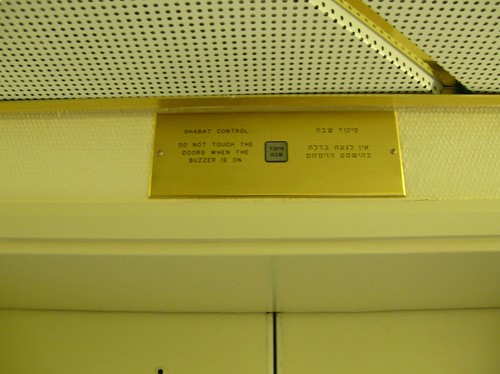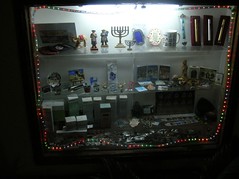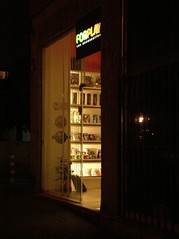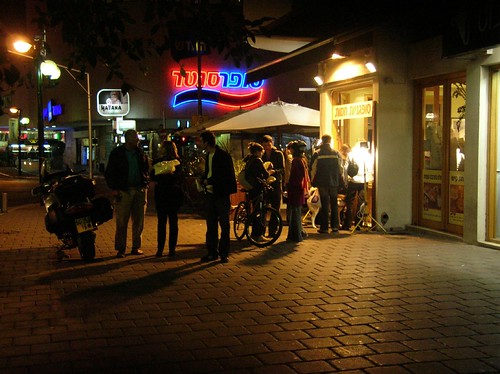Monday, December 18, 2006
Shabbat control
Many of Shabbat's strictures that go beyond store closings are publicly observed. It's a complicated set of rules, with many extenuations, made more complicated by the web of varying rabbinic interpretations plus the accommodating and ignoring of the rules that goes on in this officially religious but also very secular country. For instance, buses don't run, but taxicabs do.
Presumably, activating the "shabbat control" turns this
ordinary hotel elevator into a "shabbat elevator."
ordinary hotel elevator into a "shabbat elevator."
I don't pretend to understand the nuances of how this tradition is practiced. I was interested (though confused) about the lights. According to Wikipedia:
Another example [of activity forbidden on shabbat] is the prohibition (according to Orthodox and some Conservative rabbinic authorities) against turning electric devices on or off, which is derived from one of the "39 categories of work (melachot)". However, the authorities are not in agreement about exactly which category (or categories) this would fall under. One view is that tiny sparks are created in a switch when the circuit is closed, and this would constitute "lighting a fire" (category 37). If the appliance is one whose purpose is for light or heat (such as an incandescent lightbulb or electric oven) then the lighting or heating elements may be considered as a type of fire; if so, then turning them on constitutes both "lighting a fire" (category 37) and "cooking" (a form of baking, category 11), and turning them off would be "extinguishing a fire" (category 36). Another view is that a device which is plugged into an electrical outlet of a wall becomes part of the building, but is nonfunctional while the switch is off; turning it on would then constitute "building" and turning it off would be "demolishing" (categories 35 and 34). A common solution involves pre-set timers for electric appliances, to turn them on and off automatically, with no human intervention on Shabbat itself.What I noticed walking around is that some streetlights were off Friday night and on Saturday night. Many stores that were closed both Friday and Saturday nights kept their lights off Friday night.
These two stores observed melachot by keeping their lights off Friday
night and turning them back on, even when closed, after shabbat.
Left: a judaica gift shop. Right: a sex toy store called "Forplay."
night and turning them back on, even when closed, after shabbat.
Left: a judaica gift shop. Right: a sex toy store called "Forplay."
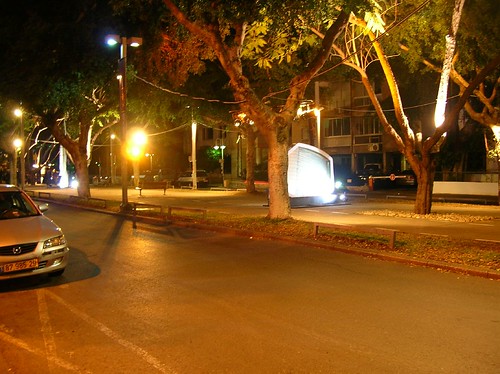
Rothschild Street. This street was minimally lit Friday night,
and the outdoor exhibit in the parkway completely dark.
Saturday day had the look and feel of a Sunday in the U.S. with people walking in parks and hanging out in cafes, but the commercial streets remained quiet.
Saturday, after sundown, these parts of the city woke up, as a number of businesses re-opened for a few Saturday night hours.
Tel Avivis line up for post-shabbat sufganiyot (jelly donuts)
on Dizengoff St., just near the central downtown shopping mall.
on Dizengoff St., just near the central downtown shopping mall.
When you think about it, the distinction between and Saturday and a Sunday sabbath is arbitrary, and so the name of the first work day after sabbath is equally arbitrary. And since sabbath here is Saturday, it is only logical that Sunday is a school and work day... the beginning of the work week in fact. And yet it felt weird to me to see the workday bustle on Sunday morning. My ingrained social clock, I guess.
Comments:
<< Home
Is electricity fire?
Funny coincidence: that's a title out of Feynman's What Do You Care What Other People Think?
It came up when he was attending a conference and talked to a bunch of rabbinical students during the off hours, and they noted that he was a physicist so they asked him about this.
Very smart guys, extremely well informed about interpretations of Shabbat and other issues of the law, and what a sad waste of time and brainpower. So said Feynman, and it sounds about right.
BTW, WHY not touch the doors? Is affecting the elevator's operation a kind of making fires or changing the building?
Post a Comment
Funny coincidence: that's a title out of Feynman's What Do You Care What Other People Think?
It came up when he was attending a conference and talked to a bunch of rabbinical students during the off hours, and they noted that he was a physicist so they asked him about this.
Very smart guys, extremely well informed about interpretations of Shabbat and other issues of the law, and what a sad waste of time and brainpower. So said Feynman, and it sounds about right.
BTW, WHY not touch the doors? Is affecting the elevator's operation a kind of making fires or changing the building?
Subscribe to Post Comments [Atom]
<< Home
Subscribe to Comments [Atom]
